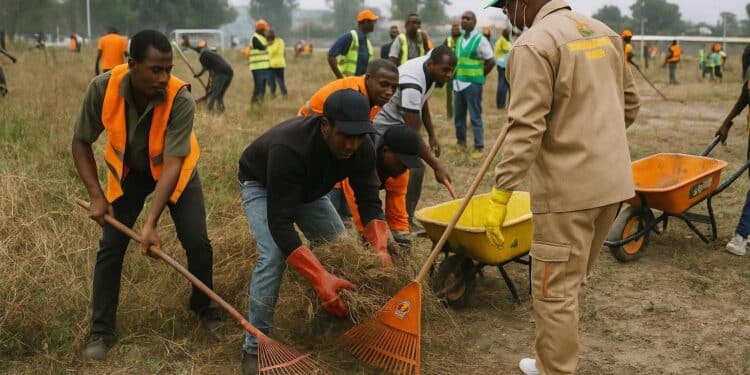Kintélé Stadium, Symbol and Test Case of Governance
The vast Concorde sports complex in Kintélé has always carried political resonance: inaugurated for the 2015 All-Africa Games, it was intended to showcase Congo-Brazzaville’s capacity for large-scale delivery. When, on the first Saturday of August, cabinet-level officials rolled up their sleeves to pick litter on its esplanade, images circulated quickly on national television and diplomatic social media feeds. According to the daily Les Dépêches de Brazzaville, more than six hundred civil servants, soldiers and student volunteers joined the effort, underscoring what Minister of State Jean-Jacques Bouya called “an exercise in ownership” of public assets (Les Dépêches de Brazzaville, 3 Aug 2023).
Observers were swift to note that the clean-up unfolded only weeks after President Denis Sassou Nguesso had instructed a multi-ministerial task force to audit sports infrastructures. The timing signalled that maintenance is now treated as integral to the life-cycle of prestige projects rather than an afterthought. That policy pivot, diplomats in Brazzaville suggest, mirrors wider African Development Bank recommendations that infrastructure be “continuously valorised” to retain macro-economic value (African Development Bank report 2021).
Task Force Diplomacy and Internal Coordination
The sanitation drive offered a revealing tableau of inter-ministerial choreography. The Ministries of Urban Sanitation, Local Development, Sports, Defence and Youth were all present, prompting a commentator on Radio Congo to describe the event as “a cabinet meeting in work-gloves”. Such visible unity contributes to a narrative of policy coherence that foreign partners often request when negotiating financing envelopes. Western development agencies, for example, have highlighted coordination as a prerequisite for blended finance arrangements in Central Africa.
By appointing Minister Bouya to steer the task force, Brazzaville reaffirmed a model of leadership that fuses political authority with technical expertise—Bouya previously led the portfolio of Grand Travaux, overseeing flagship roads and bridges. His presence beside the younger Minister Juste Désiré Mondelé conveyed generational continuity more than rivalry, an important signal in a country where cabinet reshuffles are frequently read as political barometers.
Civic Mobilisation as Soft Power
Beyond institutional optics, the Kintélé operation tapped into a powerful communicative device: mass participation. University students, neighbourhood associations and even the Venezuelan ambassador joined the effort, turning an ostensibly local sanitation task into an exercise in public diplomacy. A senior official at the Ministry of Foreign Affairs, speaking on background, described the day as “a live demonstration that Brazzaville is capable of citizen engagement without coercion”.
The episode dovetails with findings by UN-Habitat that community involvement significantly prolongs cleanliness in urban corridors (UN-Habitat 2022). When television cameras captured students singing patriotic songs while hauling refuse, the imagery provided material for state broadcasters to reinforce narratives of national cohesion. For foreign diplomats stationed in Brazzaville, the spectacle served as a reminder that urban management can become a vector of soft power, portraying stability and collective purpose in a region often marred by security headlines.
Sustainability Challenges and Enforcement
Yet the very necessity for high-profile clean-ups hints at structural hurdles. Minister Mondelé voiced frustration that some informal waste collectors deposit garbage back onto freshly swept avenues. His warning that offenders would be “interpelled without concession” signalled a readiness to complement persuasion with deterrence. Analysts note that such firmness is key if the newly contracted waste-management company, Averda Congo, is to meet its performance benchmarks.
The government has already introduced staggered dumping hours and designated transfer points, but enforcement remains uneven. A 2022 municipal audit revealed that up to thirty per cent of household refuse never reaches formal landfills, instead finding its way into drainage canals where it exacerbates flooding during the rainy season. While these data were not foregrounded during the Kintélé event, officials acknowledged privately that the clean-up is a starting shot, not the finish line.
Regional Resonance and Diplomatic Optics
Urban sanitation rarely captures continental headlines, yet the optics of ministers cleaning a stadium resonate in a Central African sub-region attentive to governance signals. Neighbouring capitals have embarked on similar cleanliness campaigns, often in the run-up to major sporting tournaments. For Congo-Brazzaville, the initiative comes as the Central African Economic and Monetary Community prepares to review urban resilience projects under its 2024–2028 strategic plan.
Some diplomats discern a calculated message: by caring for its own infrastructure, Brazzaville demonstrates readiness to host regional events and to absorb infrastructure grants responsibly. The symbolism is gentle but effective, reinforcing President Sassou Nguesso’s recurrent call for Congolese citizens to “re-appropriate the fruits of accelerated municipalisation”. In this sense, the sanitation of Kintélé is as much an environmental act as a calibrated exercise in nation branding, executed with brooms rather than communiqués.












































